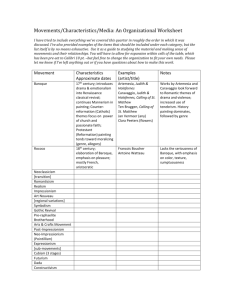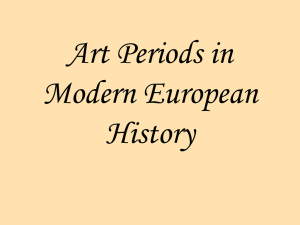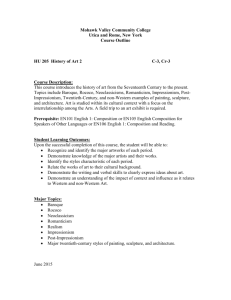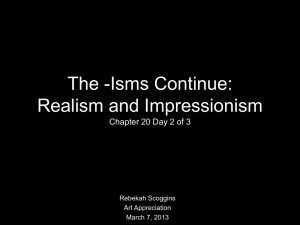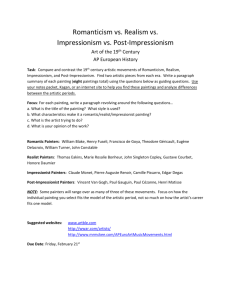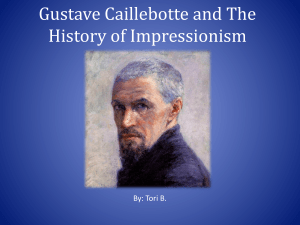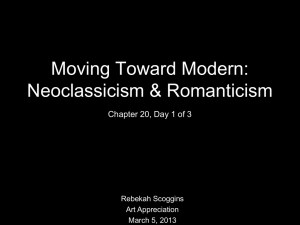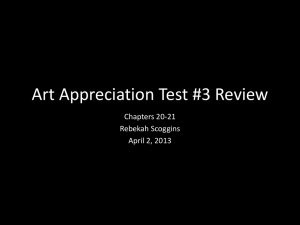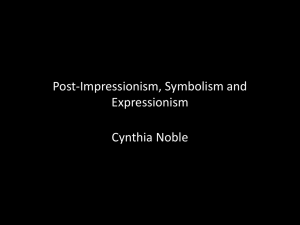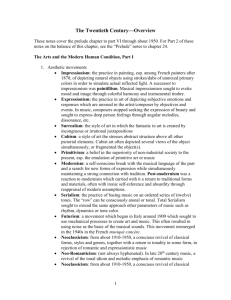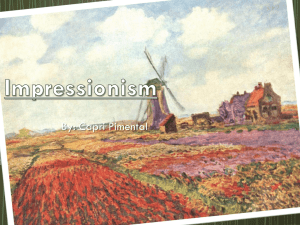Chapter 18: Modern Art
advertisement
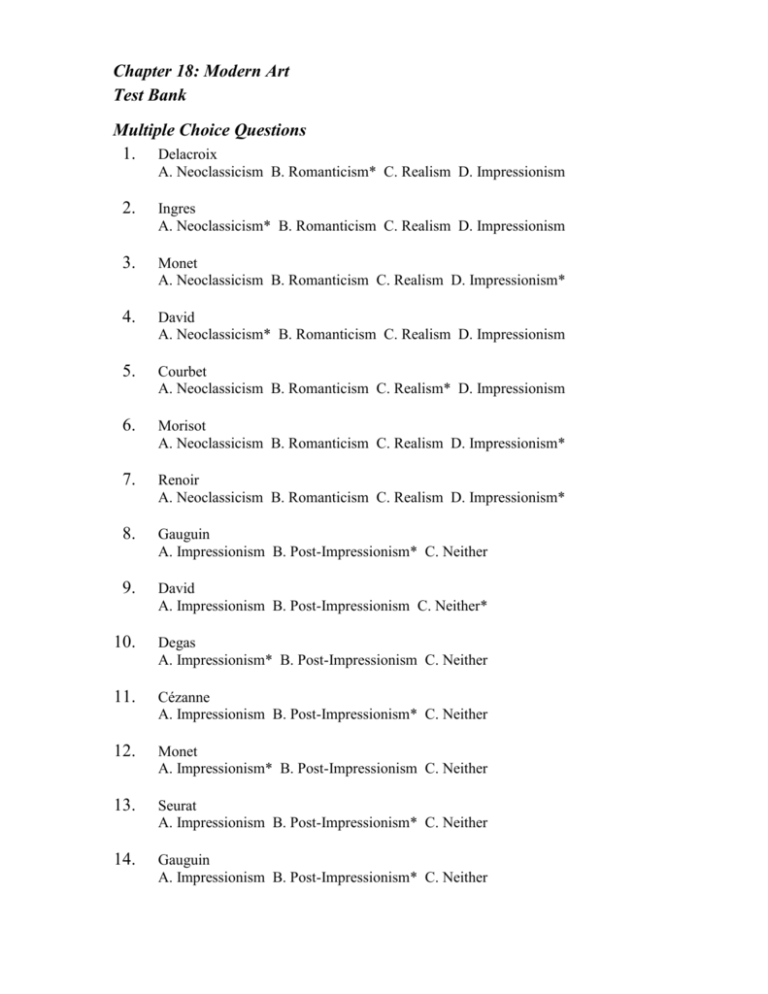
Chapter 18: Modern Art
Test Bank
Multiple Choice Questions
1. Delacroix
A. Neoclassicism B. Romanticism* C. Realism D. Impressionism
2.
Ingres
A. Neoclassicism* B. Romanticism C. Realism D. Impressionism
3.
Monet
A. Neoclassicism B. Romanticism C. Realism D. Impressionism*
4.
David
A. Neoclassicism* B. Romanticism C. Realism D. Impressionism
5.
Courbet
A. Neoclassicism B. Romanticism C. Realism* D. Impressionism
6.
Morisot
A. Neoclassicism B. Romanticism C. Realism D. Impressionism*
7.
Renoir
A. Neoclassicism B. Romanticism C. Realism D. Impressionism*
8.
Gauguin
A. Impressionism B. Post-Impressionism* C. Neither
9.
David
A. Impressionism B. Post-Impressionism C. Neither*
10.
Degas
A. Impressionism* B. Post-Impressionism C. Neither
11.
Cézanne
A. Impressionism B. Post-Impressionism* C. Neither
12.
Monet
A. Impressionism* B. Post-Impressionism C. Neither
13.
Seurat
A. Impressionism B. Post-Impressionism* C. Neither
14.
Gauguin
A. Impressionism B. Post-Impressionism* C. Neither
15.
Delacroix
A. Impressionism B. Post-Impressionism C. Neither*
16.
van Gogh
A. Impressionism B. Post-Impressionism* C. Neither
17.
Cassatt
A. American* B. French C. German D. Spanish E. English
18.
Cézanne
A. American B. French* C. German D. Spanish E. English
19.
Munch
A. American B. French C. German* D. Spanish E. English
20.
Goya
A. American B. French C. German D. Spanish* E. English
Completion/Fill-in-the-Blank Questions
21. The artists of the fifteenth century looked upon their art as ____________.
{{modern}}
22.
What was modern about the modern art of the eighteenth century in France was
its concept of ____________.
{{space}}
23.
The innovative painters of the latter 1700s brought all of the imagery to the
picture ____________.
{{plane}}
24.
The flatness or two-dimensionality of the canvas surface in early modern art was
asserted by the use of ____________ recession rather than linear recession.
{{planar}}
25.
The first period of modern art to use planar recession was ____________.
{{Neoclassicism}}
26.
Modern art declared its opposition to the whimsy of the late Rococo style with a
style called ____________.
{{Neoclassicism}}
27.
Neoclassicism was inspired by the ____________ Revolution and was designed
to heighten moral standards.
{{French}}
28.
In Neoclassicism, the ____________ Empire was often chosen as the model to
emulate.
{{Roman}}
29.
Unlike Renaissance artists, David's orthogonals led into a flattened
____________ instead of a vanishing point on a horizon line.
{{space}}
30.
David set the course for modern art with his sudden and decisive break from the
ornateness and frivolity of the ____________.
{{Rococo}}
31.
David's most prodigious student was ____________.
{{Ingres}}
32.
During the early modern period, painters who insisted on the dominance of line in
the value of a painting were called ____________.
{{Poussinistes}}
33.
During the early modern period, painters who insisted on the dominance of color
in the value of a painting were called ____________.
{{Rubénistes}}
34.
Ingres's work is a combination of harsh linearity and sculptural smoothness on the
one hand, and delicacy and ____________ on the other.
{{sensuality}}
35.
Delacroix advocated the spontaneity of painting directly on canvas without the
tyranny of meticulous preparatory ____________.
{{drawings}}
36.
Ingres believed that color ought to be subordinated to ____________.
{{line}}
37.
The Artist in the Character of Design Listening to the Inspiration of Poetry was
painted by a Neoclassicist named ____________ Kauffman.
{{Angelica}}
38.
Delacroix maintained that compositions should be constructed of ____________.
{{color}}
39.
Ironically, ____________, the man considered the greatest painter of the
Neoclassical and Romantic periods, belonged to neither artistic group.
{{Goya}}
40.
Goya devoted much of his life to the graphic representation of man's inhumanity
to ____________.
{{man}}
Discussion Questions
41. Said of David's Oath of the Horatii: "No longer does the artist desire to trick
observers into believing they are looking through a window frame into the
distance. Now the reality of the two-dimensionality of the canvas is asserted."
Explain.
42.
Whistler's Mother is a very popular painting. Part of the popularity is based on the
subject matter. Whether viewers realize it or not, what brings them back to this
painting is its composition. Explain.
43.
Briefly describe the kinds of questions that are raised when the following four
paintings are viewed side by side:
a. Ingres: Grand Odalisque
b. Delacroix: Odalisque
c. Cézanne: A Modern Olympia
d. Sleigh: Philip Golub Reclining
44.
What technical and compositional means did Goya use to reinforce the violence
of the massacre in The Third of May, 1808?
45.
React to this statement: "We never encounter the body unmediated by the
meanings that cultures give to it." Use the following works to probe your reaction.
a. Titian: Venus of Urbino
b. Manet: Olympia
c. Gauguin: Te Ari Vahine
d. Valadon: The Blue Room
46.
Does Lara Croft reverse traditional male-female power relationships? Explain
your answer.
47.
Explain what Gauguin was striving for in Synthetism.
48.
Compare and contrast Cassatt's The Boating Party and Manet's Boating. If you
were not told ahead of time that one was painted by a woman and the other by a
man, do you think you reach that conclusion by examination of the works?
Explain your answer.
49.
Explain how Rodin's Burghers of Calais represents all of the innovations of
modernism thrust into three-dimensions.
50.
Cézanne's said, "I want to make of Impressionism something solid and lasting like
the art in the museums." Explain what he meant.
